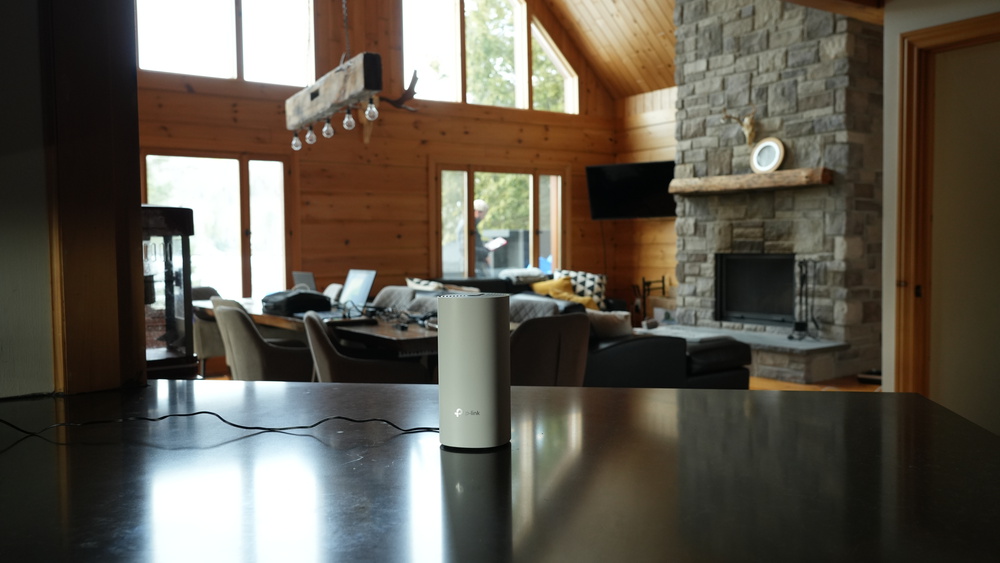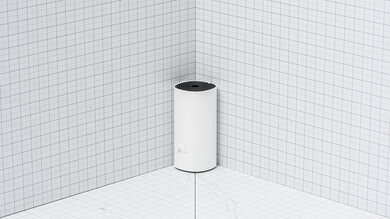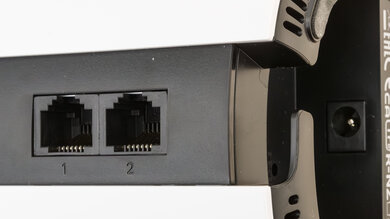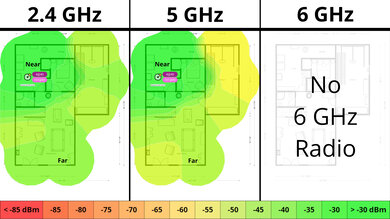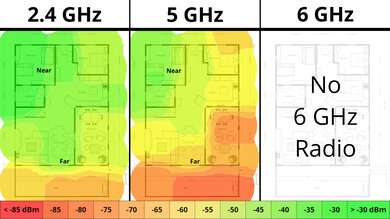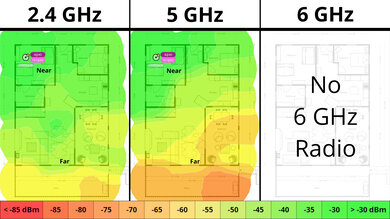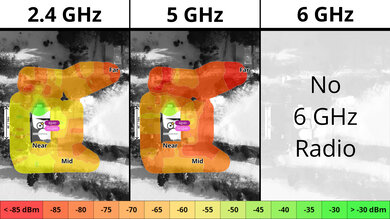The TP-Link Deco M4 is a dual-band Wi-Fi 5 router with a 2.4GHz and a 5GHz band. It's designed to be used in a mesh system and is available as a standalone unit or in a two- or three-pack. Like other routers in TP-Link's Deco lineup, it has a simple design with a small footprint. You can set it up and manage it through the Deco app. It's compatible with Amazon Alexa-enabled devices for voice control. We bought a two-pack and tested it in dual mesh mode.
Note that this router has been discontinued. TP-Link now offers the Deco S4, which has similar specs but is slightly smaller.
Our Verdict
The TP-Link Deco M4 is an adequate router for apartments, condos, and single-story homes. Its small footprint and sleek design make it easy to place in your living space. Performance-wise, it delivers decent top speeds making it suitable for 4k video streaming and downloading files quickly, but its range is mediocre, even in dual mesh mode. Also, it doesn't support Dynamic Frequency Selection (DFS), so it can't avoid more congested channels if you live in a noisy wireless environment like an apartment building.
-
Small and sleek design.
-
Decent top speeds.
-
Wi-Fi 5 can't take full advantage of Wi-Fi 6 or 7 devices.
-
Mediocre range.
-
Lacks DFS support, so it can't avoid more congested channels.
The TP-Link Deco M4 AC1200 router is okay if you live in a multi-level home. Its top speeds are good enough to saturate up to a 500 Mbps internet connection if you're close by, but its range is mediocre, especially when you're connected to the satellite unit.
-
Small and sleek design.
-
Decent top speeds.
-
Wi-Fi 5 can't take full advantage of Wi-Fi 6 or 7 devices.
-
Mediocre range.
-
Using it in dual mesh mode doesn't improve range.
The TP-Link Deco M4 AC1200 delivers decent top speeds suitable for an internet connection of up to ~500 Mbps. That said, it's only Wi-Fi 5 and doesn't support Dynamic Frequency Selection (DFS), so it can't use less congested DFS-only channels, which would help give you better speeds in noisy wireless environments.
-
Decent top speeds.
-
Wi-Fi 5 can't take full advantage of Wi-Fi 6 or 7 devices.
-
Lacks DFS support, so it can't avoid more congested channels.
The TP-Link Deco M4 AC1200 has mediocre range. While it's a mesh router that you can expand with additional units, they don't improve its range compared to just using it as a standalone router. See the Interior Long Range test for more information.
-
Wi-Fi 5 can't take full advantage of Wi-Fi 6 or 7 devices.
-
Mediocre range.
-
Using it in dual mesh mode doesn't improve range.
Changelog
Check Price
Differences Between Sizes And Variants
The TP-Link Deco M4 is available as a standalone unit or in a two- or three-pack. We bought a two-pack and tested it in dual mesh mode. You can see its label here.
Note that this router has been discontinued. TP-Link now offers the Deco S4, which has nearly the same specs but is slightly smaller in size.
Compared To Other Routers
The TP-Link Deco M4 AC1200 is a dual-band Wi-Fi 5 router with a 2.4GHz band and a 5GHz band. It's sold in single and multi-packs and is designed for use in a mesh network. It's compatible with every other TP-Link Deco model, so you can easily add more access points for better coverage. It's also compatible with Amazon Alexa devices for voice control but not Google Assistant, like some of TP-Link's other Deco models.
This is a budget mesh router with mediocre range performance. Budget standalone routers like the TP-Link Archer A8 and the ASUS RT-AX55 outperform it.
For more recommendations, check out the best mesh Wi-Fi systems, the best Wi-Fi routers for large homes, or the best routers for streaming.
Test Results
We tested this router in dual mesh mode and conducted supplementary testing in standalone mode. Contrary to our expectations, it performed better without a satellite, even at longer distances. To learn more about the mesh penalty and how mesh systems work, check out our R&D article here.
We tested this router in dual mesh mode and conducted supplementary testing in standalone mode. Contrary to our expectations, it performed better without a satellite, even at longer distances. To learn more about the mesh penalty and how mesh systems work, check out our R&D article here.
Comments
TP-Link Deco M4: Main Discussion
Let us know why you want us to review the product here, or encourage others to vote for this product.

